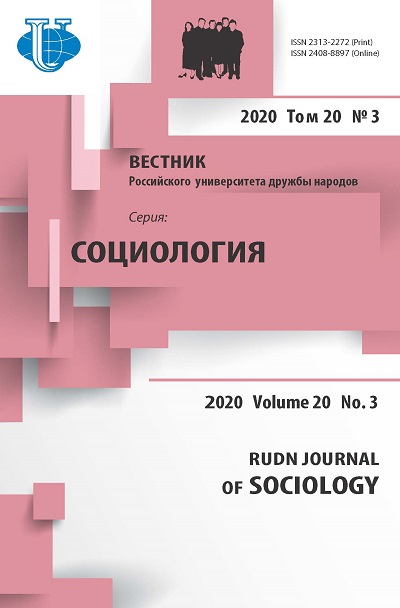Superdiversity: reconfiguration of cultural complexity of the contemporary contexts
- Authors: Kuropjatnik M.S1
-
Affiliations:
- Saint Petersburg State University
- Issue: Vol 20, No 3 (2020)
- Pages: 461-470
- Section: Theory, Methodology and History of Sociological Research
- URL: https://journals.rudn.ru/sociology/article/view/24529
- DOI: https://doi.org/10.22363/2313-2272-2020-20-3-461-470
Cite item
Full Text
Abstract
Conceptualization of the social-cultural contexts of the 21st century in terms of superdiversity implies diversification of the current diversity due to the changing patterns of global migration and transnationalization. The concept of superdiversity introduced by S. Vertovec means a new way for describing and analyzing contemporary social and cultural processes. The author considers three interrelated aspects of superdiversity: descriptive, methodological and practical (political). As a rule, superdiversity implies new immigrants who move from a larger number of countries than before, including those that did not have colonial relations with the places attracting immigrants. The emerging contexts of superdiversity are not limited to the growth of “diversity in terms of ethnicity” - a multidimensional approach to superdiversity allows it to reflect patterns of social inequality, creolization and the experience of social contacts determined by diversification of migration channels and social statuses of immigrants, of their ethnic, gender and age characteristics. Under the permanent mobility, multiple identities and diverse transnational practices, not everything can be represented in terms of ‘we-they’, ‘majority-minority’, ‘inside-outside’. Therefore, superdiversity is not related to the Other or minorities but presents a new framework for all residents of the country, regardless of their origin. Moreover, in local contexts, cultural diversity is increasingly perceived as a norm. Thus, the concept of superdiversity contributes to the development of a new cultural narrative that would replace the outdated concepts of assimilation and multiculturalism.
About the authors
M. S Kuropjatnik
Saint Petersburg State University
Author for correspondence.
Email: kuropjatnik@bk.ru
доктор социологических наук, заведующая кафедрой культурной антропологии и этнической социологии
Universitetskaya Nab., 7-9, Saint Petersburg, 199034, RussiaReferences
- Гидденс Э. Неспокойный и могущественный континент: что ждет Европу в будущем? М., 2015 / Giddens E. Nespokoyny i mogushchestvenny continent: chto zhdet Evropu v budushchem? [Turbulent and Mighty Continent. What Future for Europe?]. Moscow; 2015 (In Russ.).
- Парк Р. Избранные очерки. М., 2011 / Park R. Izbrannye ocherki [Selected Essays]. Moscow; 2011 (In Russ.).
- Цапенко И.П., Гришин И.В. (ред.). Интеграция инокультурных мигрантов: перспективы интеркультурализма. М., 2018 / Tsapenko I., Grishin I. (eds.) Integratsiya inokulturnykh migrantov: perspectivy interkulturalisma [Integration of Migrants of Different Cultures: Prospects of Interculturalism]. Moscow; 2018 (In Russ.).
- Barth F. The analysis of culture in complex societies. Ethnos. 1989; 54 (3-4).
- Bouchard G. What is interculturalism? McGill Law Journal. 2011; 56 (2).
- Cantle T. Interculturalism. The New Era of Cohesion and Diversity. London; 2012.
- Cantle T. Interculturalism as a new narrative for the era of globalization and super-diversity. Barrett M. (ed.). Interculturalism and Multiculturalism: Similarities and Differences. Strasbourg; 2013.
- Engbersen G. Floating populations, civic stratifications and solidarity: Comment on Will Kymlicka’s article “Solidarity in diverse societies”. Comparative Migration Studies. 2016; 4 (8).
- Engbersen G., Snel E. Liquid migration. Dynamic and fluid patterns of post-accession migration flows. Glorius B., Grabovska-Lusinska I., Kuvic A. (eds.). Mobility in Transition. Migration Patterns after EU Enlargement. Amsterdam; 2013.
- Eriksen T.H. The cultural contexts of ethnic differences. Man. 1991; 26 (1).
- Geldof D. Superdiversity as a lens to understand complexities. Creese A., Blackledge A. (eds.). The Routledge Handbook of Language and Superdiversity. London; 2018.
- Grillo R. Preface. Grillo R. (ed.). The Family in Question. Immigrant and Ethnic Minorities in Multicultural Europe. Amsterdam; 2008.
- Grillo R. The family in dispute: Insiders and outsiders. Grillo R. (ed.). The Family in Question. Immigrant and Ethnic Minorities in Multicultural Europe. Amsterdam; 2008.
- Kymlicka W. Solidarity in diverse societies: Beyond neoliberal multiculturalism and welfare chauvinism. Comparative Migration Studies. 2015; 17 (3).
- Meer N., Modood T., Zapata-Barrero R. A plural century: Situating interculturalism and multiculturalism. Meer N., Modood T., Zapata-Barrero R. (eds.). Multiculturalism and Interculturalism. Debating the Dividing Lines. Edinburgh; 2016.
- Meissner F., Vertovec S. Comparing super-diversity. Ethnic and Racial Studies. 2015; 38 (4).
- Modood T. Multiculturalism, interculturalism and the majority. Journal of Moral Education. 2014; 43 (3).
- Nederveen P.J. Global multiculturalism, flexible acculturation. Transcience Journal. 2010; 1 (1).
- Parkes R. People on the move. The new global (dis)order. Chaillot Papers. 2016; 138 (June).
- Strathern M. Partial Connections. Walnut Creek; 2004.
- Vertovec S. Super-diversity and its implications. Ethnic and Racial Studies. 2007; 30 (6).
- Vertovec S. Towards post-multiculturalism? Changing communities, conditions and contexts of diversity. International Social Science Journal. 2010; 61.
- Vertovec S. Introduction: Migration, cities, diversities “old” and “new”. Vertovec S. (ed.). Diversities Old and New. Migration and Socio-Spatial Patterns in New York, Singapore and Johannesburg. London; 2015.
- Vertovec S. Talking around super-diversity. Ethnic and Racial Studies. 2019; 42 (1).
- Wessendorf S. Italian families in Switzerland: Sites of belonging or “golden cages”? Perceptions and discourses inside and outside the migrant families. Grillo R. (ed.). The Family in Question. Immigrant and Ethnic Minorities in Multicultural Europe. Amsterdam; 2008.
- Wessendorf S. Commonplace Diversity: Social Relations in a Superdiverse Context. London; 2014.
- Zapata-Barrero R. Exploring the foundations of the intercultural policy paradigm: a comprehensive approach. Identities. Global Studies in Culture and Power. 2016; 23 (2).
- Zapata-Barrero R. Interculturalism in the post-multicultural debate: A defense. Comparative Migration Studies. 2017; 14 (5).














